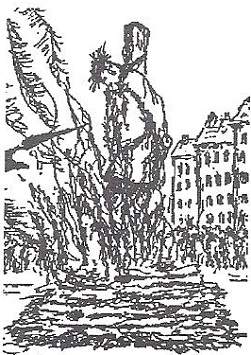The John Calvin and Michael Servetus Debacle
John Calvin Was Responsible For The Death Of Michael Servetus
RELATED: Calvinism Refuted
 On October 27, 1553 John Calvin, the founder of Calvinism, had Michael Servetus, the Spanish physician, burned at the stake just outside of Geneva for his doctrinal beliefs!(1) Hence, the originator of the popular doctrine of "once saved always saved" (known in certain circles as "perseverance of the saints") violated the cry of the Reformation -- "Sola Scriptura" -- by murdering a doctrinal heretic without Scriptural justification.
On October 27, 1553 John Calvin, the founder of Calvinism, had Michael Servetus, the Spanish physician, burned at the stake just outside of Geneva for his doctrinal beliefs!(1) Hence, the originator of the popular doctrine of "once saved always saved" (known in certain circles as "perseverance of the saints") violated the cry of the Reformation -- "Sola Scriptura" -- by murdering a doctrinal heretic without Scriptural justification. This event was something John Calvin had considered long before Michael Servetus was even captured, for John Calvin wrote his friend, Farel, on February 13, 1546 (seven years prior to Michael Servetus' arrest) and went on record as saying:
This event was something John Calvin had considered long before Michael Servetus was even captured, for John Calvin wrote his friend, Farel, on February 13, 1546 (seven years prior to Michael Servetus' arrest) and went on record as saying:"If he [Servetus] comes [to Geneva], I shall never let him go out alive if my authority has weight."(2)Evidently, in that day John Calvin's authority in Geneva, Switzerland had ultimate "weight." This is why some referred to Geneva as the "Rome of Protestantism"(3) and to John Calvin as the "Protestant 'Pope' of Geneva."(4)
During Servetus' trial, John Calvin wrote:
"I hope that the verdict will call for the death penalty."(5)All this reveals a side of John Calvin that is not well-known or very appealing, to say the least! Obviously, he had a prolonged, murderous hate in his heart and was willing to violate Scripture to put another to death and in a most cruel way. Although John Calvin consented to Michael Servetus' request to be beheaded, he acquiesced to the mode of execution employed. But why did John Calvin have a death wish for Michael Servetus?
"To rescue Servetus from his heresies, Calvin replied with the latest edition of his 'Institutes of the Christian Religion,' which Servetus promptly returned with insulting marginal comments. Despite Servetus's [sic] pleas, Calvin, who developed an intense dislike of Servetus during their correspondence, refused to return any of the incriminating material."(6)
"Convicted of heresy by the Roman Catholic authorities, Servetus escaped the death penalty by a prison break. Heading for Italy, Servetus unaccountably stopped at Geneva, where he had been denounced by Calvin and the Reformers. He was seized the day after his arrival, condemned as a heretic when he refused to recant, and burned in 1553 with the apparent tacit approval of Calvin."(7)
In the course of his flight from Vienne, Servetus stopped in Geneva and made the mistake of attending a sermon by Calvin. He was recognized and arrested after the service.(8)
"Calvin had him [Servetus] arrested as a heretic. Convicted and burned to death."(9)From the time that John Calvin had him arrested on August 14th until his condemnation, Michael Servetus spent his remaining days:

" ... in an atrocious dungeon with no light or heat, little food, and no sanitary facilities."(10)Let it be noted that the Calvinists of Geneva put half-green wood around the feet of Michael Servetus and a wreath strewn with sulfur on his head. It took over thirty minutes to render him lifeless in such a fire, while the people of Geneva stood around to watch Michael Servetus suffer and slowly die! Just before this happened, the record shows:
"Farel walked beside the condemned man, and kept up a constant barrage of words, in complete insensitivity to what Servetus might be feeling. All he had in mind was to extort from the prisoner an acknowledgement [sic] of his theological error -- a shocking example of the soulless cure of souls. After some minutes of this, Servetus ceased making any reply and prayed quietly to himself. When they arrived at the place of execution, Farel announced to the watching crowd: 'Here you see what power Satan possesses when he has a man in his power. This man is a scholar of distinction, and he perhaps believed he was acting rightly. But now Satan possesses him completely, as he might possess you, should you fall into his traps.'
When the executioner began his work, Servetus whispered with trembling voice: 'Oh God, Oh God!' The thwarted Farel snapped at him: 'Have you nothing else to say?' This time Servetus replied to him: 'What else might I do, but speak of God!' Thereupon he was lifted onto the pyre and chained to the stake. A wreath strewn with sulfur was placed on his head. When the faggots were ignited, a piercing cry of horror broke from him. 'Mercy, mercy!' he cried. For more than half an hour the horrible agony continued, for the pyre had been made of half-green wood, which burned slowly. 'Jesus, Son of the eternal God, have mercy on me,' the tormented man cried from the midst of the flames ...."(11)Although we essentially have the same in the conversion of the repentant thief (Lk. 23:42,43 cf. Lk. 18:13) and the Scripture, "Everyone who calls on the name of the Lord will be saved" (Acts 2:21; Rom. 10:13), Farel still reckoned Michael Servetus an unsaved man at the end of his life:
"Farel noted that Servetus might have been saved by shifting the position of the adjective and confessing Christ as the Eternal Son rather than as the Son of the Eternal God."(12)

"Calvin had thus murdered his enemy, and there is nothing to suggest that he ever repented his crime [sic]. The next year he published a defence [sic] in which further insults were heaped upon his former adversary in most vindictive and intemperate language."(13)
No comments:
Post a Comment